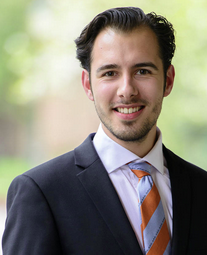‘We haven’t been left out’
Staff members from the university council have openly expressed their criticism of the state of affairs surrounding the future campus in China. They feel that they have not received enough information from the university board to be able to make a well-informed decision. They also feel that the executive board is not listening to them and that they are being pushed aside. The finger is also being pointed at the student parties who have supposedly allowed themselves to be swayed by the university board to approve of the campus.
The student parties deem this nonsense. ‘From the staff’s side, there is talk of the students having approved of the campus without knowing any facts, but that is rubbish. Hundreds of pages were discussed during meetings, which were so detailed that even the number of cubic meters for a cage for laboratory animals was addressed’, says Leon Sloots, former chairperson of the Lijst Sterk student party.
‘If something truly unacceptable happens, then we will withdraw our support’Not yet approved
According to the student parties, the Yantai campus was not entirely approved of in June. ‘For us, it was about making negotiations possible so that president Sibrand Poppema could go to China to negotiate with the partners. The university board had said at the time that if there were big changes to the plan for the branch campus or if new information came to light, that a joint decision would be made with the representatives. We can still say no if we feel that it will not suit the university or if it means taking too many risks, or if academic freedom cannot be guaranteed’, says SOG chairperson Alexander van ‘t Hof.
Nathalie Niehof, chairperson of Lijst Calimero, shares this view. ‘We have approved of the negotiations and we are following the developments closely. If something happens which is unacceptable in our eyes, we will withdraw our support’.
Benefits
Students see many benefits in opening a sister campus in China. ‘Demographically, the number of Dutch students will fall starting in 2020. The necessity to become more accessible to the international market will thus grow’, says Sloots. ‘It is of enormous importance then that the RUG has a strong, competitive position. By going to China, the number of students will increase, and having more students leads to more staff. Having more staff leads to more publications, and more publications, whether we like it or not, leads to a higher ranking, which means a stronger international competitive position.’
‘In order to stay relevant, the RUG has to go along with international developments. The risk of doing nothing is higher than the risk of Yantai’, adds Van ‘t Hof. ‘It is now or never. There are currently nine branch campuses and we are allowed to have one more in China. If we do not do it now, we will never be able to’.
The chairman of Lijst Calimero feels that taking the step towards Yantai puts the RUG on the map internationally. ‘It ensures that we get more opportunities in the field of research and makes it easier for students to study part of their programme abroad.’
No deal
There is no deal between the student parties and the university board, they say. It may have seemed that way because the day before the vote, two members of Lijst Calimero – the only student party who still had some doubts – were invited for a chat with RUG board member Jan de Jeu. However, former council member Rowanne Degenhart informed the UK that that chat was only ‘informative’ and did not have any influence on the final decision.
Niehof makes it clear: ‘We have the interests of more than 30,000 RUG students at heart, not the board of directors.’
Promises
The Lijst Calimero party put a number of requirements forward to the university board in June, such as separate financing, separate accreditation and a limited flow of instructors from the academic programmes that will be taken to Yantai. ‘The board of directors has already promised that, and they have addressed all of our worries up to this point. Together with the benefits which have been mentioned, that was enough reason for us to approve of the campus during the meeting.’
Personal struggle
According to SOG and Lijst Sterk, the real reason for the discontent of the staff members is a feud between them and RUG president Sibrand Poppema.
‘Only Hilly Mast (former chairperson of the university council and current member of the personnel faction, red.) was against the campus in China, presumably because of a personal feud with Sibrand Poppema’, says Sloots of Lijst Sterk. ‘In her role as chairperson of the council, she often blocked information from the board of directors and tried to keep the contact between Sibrand and the students to a minimum. Sibrand and Hilly have known each other for a long time. Perhaps it has left a bitter taste that one has become a successful leader while the other has not gotten any further than being a participant. I genuinely think that this whole China issue is nothing more than an opportunity for its biggest opponent, Hilly, to deprive Sibrand of the crowning achievement of his career.’
‘She has a personal vendetta against president Sibrand Poppema’Van ‘t Hof also speaks of a personal vendetta. ‘If you openly say that you cannot keep up with Poppema, it is a form of giving up and showing that it is not about the topic anymore, it is about a quarrel, which has nothing to do with the campus and everything to do with Poppema. Then you’re not actually taking the issues you have at heart seriously. In a representative position, you have to be able to put your personal feelings aside.’
Mast denies the quarrel. ‘I’m not a vendetta type of person. I did find it necessary to clearly mention a few issues mainly with regards to the current policy of the board of directors. Considering Poppema’s position and that he is a prominent figurehead for the RUG board, I decided to bring this to his attention. Furthermore, I have always generally gotten on well with Sibrand Poppema. Why am I so against the campus at this moment in time? I want to protect the RUG from a gigantic step which could have unpleasant consequences for the future of our beautiful university.’
Mapped out
The final say on Yantai has not yet been given. The student parties insist that they are staying on top of proceedings. ‘Last week, during the committee meetings, a clear outline of the agreements of the board of directors, including questions from students and staff and the answers to these, was promised. We feel that this is a step in the right direction’, says Niehof.









